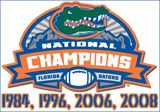Statistical Characteristics of BCS Champions
We can’t know who will win the BCS title this year (though we do have a certain bias here). However, based on the statistics of the BCS champions this decade, we can have a pretty good idea – statistically – what they will look like. We also know what statistical categories are mostly irrelevant to BCS title success.
I’ve compiled the NCAA stats for the past 9 BCS Champions (Oklahoma in 00’ to Florida in 08’) and found that title winners have certain common characteristics. Likewise there are certain statistical categories that appear unrelated to eventual BCS success. The statistics I looked at were –
Kickoff Returns
Net Punting
Pass Defense
Pass Efficiency Defense
Passing Efficiency
Passing Offense
Penalty Yards per Game
Punt Returns
Rushing Defense
Rushing Offense
Scoring Defense
Scoring Offense
Total Defense
Total Offense
Turnover Margin
So, want to be a BCS Champion? Then make sure your team is strong the certain following statistical categories, while not worrying about these others -
You Will Pass Efficiently – The fourth most common characteristic of BCS title winners is that, when they decided to throw, they did so efficiently. The average BCS champion had a national rank of 12.3 in this category, or an average rating of 150.0. (What exactly is passing efficiency? Well th NCAA formula is: [ { (8.4 * yards) + (330 * touchdowns) - (200 * interceptions) + (100 * completions) } / attempts ]. Suffice to say if you complete a lot of passes for yardage and touchdowns without throwing interceptions, you are doing well.)
Exemplar – Texas 2005, 1st overall with a 160.96
Contrarian – LSU 2007, 37th overall with a 133.61
Last Season
2008 Florida – The Gators were 4th in this category at a rating of 170.6.
2009 Fail – Virginia Tech. Yes they had 10 wins. But with a rating 108.12 they were ranked 99th in the nation.
You Don’t Need Passing Yardage – This may seem contradictory to the previous, but teams that have a lot of passing yardage aren’t necessarily successful. The average national rank of BCS champs is 42.5 nationally at 237.2 yards per game. Teams that throw for many yards don’t win it all.
Exemplar – Ohio State 2002. The Buckeyes were 92nd in the country in passing offense with only 173.2 ypg.
Contrarian– The best passing offense to win it all? USC in 2004, but they were only 13th nationally with 271.7 ypg. No team in the top 10 in passing yardage has won the BCS championship.
Last Season
2008 Florida - The Gators were ranked only 61st in the nation in passing yardage per game at 213.9.
2008 Fail – Texas Tech. The Red Raiders had the number 1 passing offense in the nation at 413.2 yards per game, but it didn’t stop them from getting blown out by Oklahoma and losing their bowl game to Ole Miss. Also, Missouri was 4th overall in the nation but ended up with 4 losses.
You Will Defend the Pass Efficiently – The other side of passing efficiently is defending efficiently, which means not letting the other team pass effectively. As we have seen they can get a lot of yards (Texas Tech had 361 yards passing in their 44 point loss to Oklahoma) as long as they don’t score. The average national rank for Passing Efficiency Defense of BCS winners is 6.7 with a rating of 95.3.
Exemplar – Miami 2001, 1st overall with a 75.6
Contrarian – USC 2004, 9th overall with a 101.33. No team has ever won the BCS title with a Passing Efficiency Defense worse than 9th nationally.
Last Season
2008 Florida – UF was 3rd ranked nationally with a rating of 96.8.
2008 Fail – Missouri. The Tigers gave up big plays passing, and often. Ranked 80th in the nation they had a rating of 133.6.
You Don’t Need Kick Returns – Obvious, perhaps, but Kickoff and Punt returns were among the least relevant stats to BCS success, with average national ranks of 48.3 and 32.6 respectively.
Last Season
2008 Florida – The Gators ranked 55th nationally in Kickoff returns.
2008 Fail – The Temple Owls were the number one kickoff return team in the NCAA. Enough said.
You Will Have Great Total Defense – Perhaps obvious this one, but the average national ranking for total defense for BCS champions is 8.0, surrendering a meager 281.6 yards per game.
Exemplar – LSU 2003, 1st nationally giving up only 252 ypg.
Contrarian – OSU 2002, 23rd overall surrendering 320.9 ypg.
Last Season
2008 Florida – The Gators were 9th nationally in this stat, giving up only 285.3 yards per game.
2008 Fail – Oklahoma State – The Cowboys managed 9 wins, but with a national ranking of 93 in total defense giving up 405.5 yards per game, they weren’t going to win any titles.
You Don’t Need a Top Offense – Yeah, it’s true. The average national ranking of Total Offense, or the number of total yards per game, of BCS title winners is 26.8. LSU in 2007 was the 26th ranked offense, and in 2003 they ranked 31st. Ohio State in 2002? The 70th ranked offense in the nation. However, offense certainly doesn’t hurt, and the best BCS Champion offense was Texas at 3rd. It just isn’t critical.
Exemplar – Ohio State 2002, 70th in the nation in offense with only 364.5 ypg.
Contrarian – Texas 2005, 3rd in the nation in Total Yards at 512.1 ypg. Only 2 teams in the top 10 in total yards (Texas and Miami 01’) have won the BCS title.
Last Season
2008 Florida – The Gators were 15th in the nation, among their worst major statistical categories at 445.1 yards per game.
2008 Fail – A group award here. Offense ranked higher than the Gators in 2008 include –
Houston
Nevada
Oklahoma State
Oregon
Missouri
Rice
Nebraska
Louisiana Lafayette
Not one of them won a title in anything.
You Will Stop Your Opponents from Scoring – The absolute most common and critical shared characteristic of BCS Champions. The average Scoring Defense ranking of BCS winners is 5.4, and champions surrender an average of only 13.9 points per game. 9 of the past 10 winners was in the top eight nationally in this category. Essentially if your team is giving up more than 16 points per game, you can’t and won’t win the BCS title.
Exemplar – LSU in 03’ and Miami in 01’ were both number 1 in the nation in Scoring Defense giving up just 11 and 9.4 points per game, respectively.
Contrarian – LSU 2007, 17th overall at 19.9 ppg, but this stat included two high scoring overtimes. Excepting LSU that year, no team worse than 8th overall in Scoring Defense has ever won the BCS, nor any team that allowed more than 16.4 ppg.
Last Season
2008 Florida – The Gators were 4th ranked nationally at 12.9 points per game.
2008 Fail – Oregon. Yes, a 10 win season. But what might have been with just a little defense, as the Ducks gave up 28.2 points per game for a 78th national ranking in the category.
You Don’t Need to Worry About Penalties – It’s true. Not only are they irrelevant to whether you win it all, in fact more highly penalized teams seem MORE successful than not. The average national ranking in Penalty Yards per Game of BCS Champions is an astounding 76.9, and the average Champion gives up 61.1 yards per game to penalties. In fact, 7 of the past 9 Champions ranked 73rd or worse in this category!
Exemplar – Miami 2001, 114th nationally at 85.8 ypg.
Contrarian – Ohio State 2002, 10th nationally at 40.3 ypg.
Last Season
2008 Gators – 95th national in yards penalized at 59.9 yards per game.
2008 Fail – Top ten among least penalized teams in 2008 included Navy, Pitt, Iowa, Arizona, Vanderbilt, Army and Boston College.
And there you have it. If you want to hoist that crystal trophy come January 2010, make sure you play great defense – against the pass, overall and keep your opponents from scoring, and on offense pass efficiently.
Don’t worry too much about kick returns, or throwing for a lot of yards (you listening Big 12?). Mostly, however, don’t worry about penalties in the general sense.
Simple, right?
NEXT: Who it might be this year, based on the statistics





 Mentioned in Austin Murphy's book
Mentioned in Austin Murphy's book 


3 comments:
Its amazing how hand in glove some of these stats are. If you throw efficiently you are making first downs, keeping control of the ball, and multiplying the scoring prevention of your defense. Based on which statistics seem to have relevance you can almost draw up what a MNC winning team might look like without knowing any of the current competitors. Is time of possession a significant stat in any way?
I _really_ wish the NCAA would exclude overtime stats and simply award 1 point to the winner.
As pointed out above it totally skews comparisons.
Duke - They (the NCAA) hasn't kept TOP stats going back to 2000, so the comparison would be limited.
But I do agree that many of the stats are highly correlated.
Post a Comment